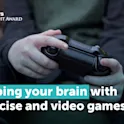
Neuroscience
29 Aug 2017
Dancing can reverse the signs of aging in the brain
New research, published in Frontiers in Human Neuroscience compares two fitness routines to explore anti-aging effects on the brain in the elderly.

Neuroscience
29 Aug 2017
New research, published in Frontiers in Human Neuroscience compares two fitness routines to explore anti-aging effects on the brain in the elderly.

Neuroscience
27 Jul 2017
A study has identified the 100 most-cited neuroscience papers, and their research topics and journals.

Life sciences
05 Jul 2017
Frontiers in Human Neuroscience review article outlines structural brain changes caused by video games

Frontiers news
28 Jun 2017
With an Impact Factor of 3.209, Frontiers in Human Neuroscience is the 1st most cited Psychology journal in the world.

Neuroscience
23 May 2017
New research, published in Frontiers in Human Neuroscience makes the case against fixed starting times, i.e. a fixed one-size-fits-all daily routine.

Health
19 May 2017
This Research Topic, published in Frontiers in Human Neuroscience, investigates cognitive training techniques in health and disease, and in youth and old age.

Neuroscience
01 Mar 2017
Our emotions are often affected by images and visual memories. What if we could train our own brains to use imagery and effect our emotional state?

Neuroscience
29 Nov 2016
Sleep deprivation affects children’s brains differently than adults’, according to a new study By K.E.D. Coan, Science Writer Any parent can tell you about the consequences of their child not getting enough sleep. But there is far less known about the details of how sleep deprivation affects children’s brains and what this means for early brain development. “The process of sleep may be involved in brain ‘wiring’ in childhood and thus affect brain maturation,” explains Salome Kurth, first author of the study published in Frontiers in Human Neuroscience, and a researcher at the University Hospital of Zurich. “This research shows an increase in sleep need in posterior brain regions in children.” This contrasts with what researchers know about the effects of sleep deprivation in adults, where the effect is typically concentrated in the frontal regions of the brain. After staying up too late, both children and adults need a period of deep sleep to recover. This recovery phase is characterized by an increase in an electrical pattern called slow-wave activity, which can be measured with a non-invasive technique called an electroencephalogram. With a large number of electrode channels distributed across the scalp, this method also detects which brain regions show […]

Neuroscience
26 Oct 2016
By Srividya Sundaresan, Science Writer Recent research shows brain-to-text device capable of decoding speech from brain signals Ever wonder what it would be like if a device could decode your thoughts into actual speech or written words? While this might enhance the capabilities of already existing speech interfaces with devices, it could be a potential game-changer for those with speech pathologies, and even more so for “locked-in” patients who lack any speech or motor function. “So instead of saying ‘Siri, what is the weather like today’ or ‘Ok Google, where can I go for lunch?’ I just imagine saying these things,” explains Christian Herff, author of a review recently published in the journal Frontiers in Human Neuroscience. While reading one’s thoughts might still belong to the realms of science fiction, scientists are already decoding speech from signals generated in our brains when we speak or listen to speech. In their review, Herff and co-author, Dr. Tanja Schultz, compare the pros and cons of using various brain imaging techniques to capture neural signals from the brain and then decode them to text. The technologies include functional MRI and near infrared imaging that can detect neural signals based on metabolic activity of […]

Neuroscience
07 Sep 2016
By Mark Wartenberg, Frontiers Science Writer Emotionally invested parents can mean children are more likely to be successful later in life, a study published in Frontiers in Human Neuroscience shows. Looking at 27 children aged between four and six, the study examined the quality of the emotional bond to their parents, and their cognitive control including: resisting temptation, their ability to remember things, and whether they are shy or withdrawn. Maximizing children’s chances of success can seem daunting and an impossibly tall order. This research found a caring and emotionally attentive environment is liable to be a long-term game-changer. The study involved a combination of questionnaires, behavioral tasks and electrophysiological measurements. The researchers looked at the quality of the emotional bond – referred to as emotional availability (EA) – between mothers and children. Second, the children’s executive functions were measured through a number of exercises. Finally, the study measured the neural responses of children who were tasked to inhibit certain aspects of their behavior. This was achieved through EEG (Electrotroencephalography) by measuring small variations in voltage in certain key parts of the brain. Dr Schneider-Hassloff, a researcher on the study, noted: “this study investigated the association between emotional interaction […]

Neuroscience
27 May 2016
By Mônica Favre, Ph.D., Frontiers Science Writer Neuroscientists are on their way to turn a person’s thoughts into speech producible by a device, to help victims of stroke and others with speech paralysis to communicate with their loved ones. Professor Robert T. Knight, M.D., and his team at UC Berkeley are working on finding a way to decode speech imagined in the human brain. “We learned that hearing words, speaking out loud or imagining words involves mechanisms and brain areas that overlap. Now, the challenge is to reproduce comprehensible speech from direct brain recordings done while a person imagines a word they would like to say,” said Knight, who is also the Founding Editor of Frontiers in Human Neuroscience. Knight says the goal of the device is to help people affected by motor disease, such as paralysis and Lou Gehrig’s Disease. “There are many neurological disorders that limit speech despite patients being fully aware of what they want to say,” Knight said. “We want to develop an implantable device that decodes the signals that occur in the brain when we think about a word, then turn these signals into a sound file that can be reproduced by a speech device.” […]

Neuroscience
11 May 2016
By Abigail Pattenden, Frontiers Science Writer A new discovery could help people suffering with single-sided deafness (SSD) find a treatment quicker – and could potentially lead to a cure. SSD affects around 9,000 people per year in the UK, and around 60,000 per year in the US. It can be caused by a number of things – from viral infections to brain tumours – and is currently incurable and difficult to treat. Symptoms of SSD include impaired hearing, difficulty filtering out background noise, and difficulty determining sound direction. A major stumbling block to finding the best treatment has been the current lack of biomarkers against which to measure a treatment’s efficacy, but Dr Srikantan Nagarajan – a specialty chief editor of Frontiers in Human Neuroscience, along with Dr Steven Cheung, and a group of scientists based at the University of California have been looking at brain plasticity in response to the development of SSD. Their recent discovery could pave the way to the development of such biomarkers, and potentially, a cure. Brain plasticity is the ability of the brain to modify its own structure and function in response to changes within the body (e.g., disease) or external factors. It is […]

Life sciences
27 Apr 2016
By Tania FitzGeorge-Balfour, Frontiers science writer In recent years there has been an explosion in the number of smartphone apps aimed at ‘brain training’. These games often make confident statements about improving our mental performance, but there is little scientific evidence to show that they do. A new study in the open-access journal Frontiers in Human Neuroscience has investigated why consumers decide to download these apps, how they use them and what they think their benefits may be. “While the evidence of the effectiveness of brain training remains controversial, our results suggest that the public is interested in learning more about the actual science behind the claims made by the app developers,”says Dr. John Torous, a clinical psychiatrist at the Beth Israel Deaconess Medical Center, Boston, lead author of the study. Young people and those with internet access tend to have high rates of smartphone ownership, so Dr. Torous and his co-authors designed a survey targeted at this group. They asked participants about their thoughts, use and experience of brain-training apps. Over three thousand people responded, making this the largest internet survey to date asking consumers about these apps; the results were insightful. Over two thirds of those that responded […]

Neuroscience
20 Nov 2015
Laurence Pope is a Journal Operations Specialist at Frontiers. He studied biochemistry and science communication at Imperial College London before joining Frontiers in 2013. His staff pick this week comes from Frontiers in Human Neuroscience: The role of the primary auditory cortex in the neural mechanism of auditory verbal hallucinations. “We often assume that only people with schizophrenia and other mental disorders experience auditory hallucinations (or ‘hearing voices’). In fact about 5% of mentally healthy people also hear voices, but these people can control how they respond to them, such as ignore them or record what they hear. It’s these people who may ultimately hold the key to better management of schizophrenia. “The authors of this study found that such people have a better ability to regulate their primary auditory cortex, the area of the brain responsible for processing sound, compared to people with schizophrenia. When auditory hallucinations occur mentally healthy people can direct their attention outwards, while people with schizophrenia have difficulty focusing on external sounds and direct their attention inwards. “These discoveries help bring us closer to understanding how auditory hallucinations occur and why such hallucinations affect people differently.”

Impact analysis
20 Nov 2015
Frontiers in Human Neuroscience has an Impact Factor of 3.634 and is the #1 most-cited journal in psychology.
Get the latest research updates, subscribe to our newsletter